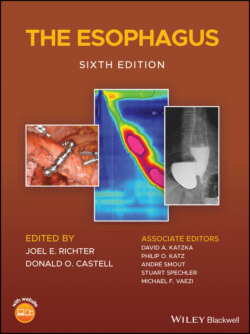Читать книгу The Esophagus - Группа авторов - Страница 28
GERD and extraesophageal symptoms
ОглавлениеMany patients seek care from pulmonologists and otolaryngologists for what are referred to as extraesophageal symptoms of GERD. In these patients, the typical symptoms of heartburn and regurgitation are usually mild. Otolaryngologic symptoms that have been attributed to GERD include chronic cough, hoarseness, change in voice, dental erosion, and halitosis. It is not uncommon for many of these patients to have a normal laryngeal examination, which does not rule out the potential for underlying reflux disease. GERD is thought to cause cough and to serve as a potential trigger for asthma due to increased bronchial reactivity, increased vagal tone, and the microaspiration of small amounts of gastric refluxate. One systematic review of 28 studies of asthma patients found that 59% had GERD symptoms and 51% had abnormal pH testing [44]. GERD also has been found to be an independent predictor associated with future risk of asthma attacks [45] and is a frequent comorbidity (46%) in patients with difficult‐to‐treat or severe asthma [46]. In patients who have regurgitation, the presence of recurrent pneumonias, fever, and chronic cough is suggestive of aspiration. For many extraesophageal symptoms, however, causality has not been established. The role that GERD plays as the unifying diagnosis of these symptoms is often overestimated, and in many patients, the underlying etiology is often multifactorial. It is therefore important that the management of patients with extraesophageal symptoms includes a collaboration with otolaryngology and pulmonology. As part of their evaluation, many patients undergo an empiric trial of acid‐suppressive therapy, followed by formal ambulatory pH testing in those who fail therapy. The evaluation and management of otolaryngologic and pulmonary symptoms and complications of GERD are discussed further in Chapters 11, 31, and 32.
